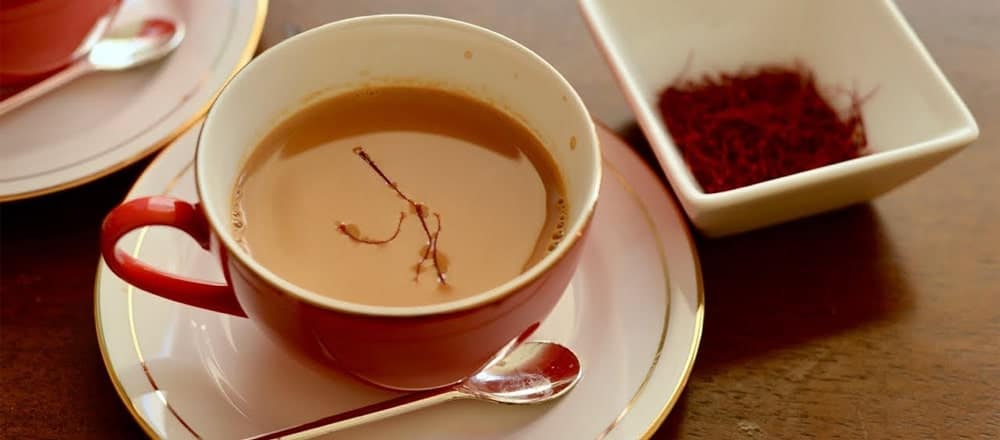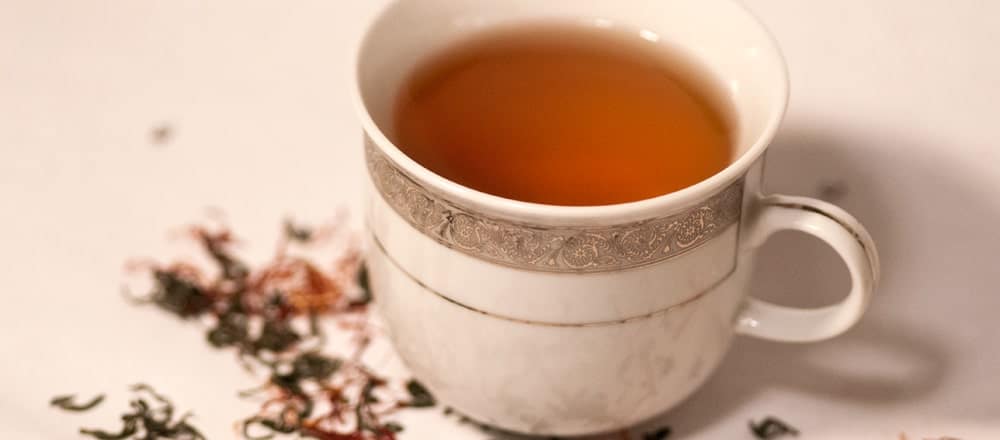Saffron Tea Benefits and Side Effects

Saffron Tea is the “sunshine spice.” It is so-called because the benefits of Saffron Tea extend to depression relief. And that’s not all on offer here. This sweet, subtle infusion maintains the heart, improves skin health and even enhances eyesight.
The Kent and Sussex Tea and Coffee Company hope to be stocking it soon. Until then, you can discover the answers to the above questions, as well as, and perhaps most importantly, “What does Saffron Tea taste like?” (Spoiler alert: it’s good).
It’s also worth noting that we pack almost all of our 1,000 types of Loose Tea fresh to order, thus ensuring quality and consistency. Shall we begin?
Table of contents

What is Saffron Tea?
Saffron is a spice that comes from the flowers of the saffron crocus (Crocus sativus). The plant itself originates from the Middle East and parts of Europe.
Today, cultivation predominantly takes place in Iran, India and Greece, with harvesting coinciding with the flowering season between October and November. The flower produces dark-red stigmas, which workers remove by hand.
These threads are where we get the spice used to make Saffron Tea. It is also an ingredient found in a multitude of culinary dishes, as well as fabric dyes and perfumes.
Overall, people have utilised it in countless ways for some 3,500 years. Meanwhile, if you’re wondering, “What does Saffron Tea taste like?,” you can expect subtly earthy and grassy notes with sweet, floral, honey-like undertones.

The Benefits of Saffron Tea
Few people would deny that Saffron and Saffron Tea have, for millennia, had a close association with human history.
The spice has long been held in high regard for its healing properties, particularly for treating eye disorders, stomach issues, menstrual discomfort and mental health concerns.
But how much of it holds true in this day and age? Is there any proof in its potential?
The simple answer is yes. The benefits of Saffron Tea now have the backing of much of modern science. Although some of its historic applications no longer apply, others have the support of irrefutable evidence.
We will be concentrating on the latter group in the following section. Please note, however, that until we know more, we do not endorse Saffron Tea. We instead await further research.

Saffron Tea for Depression
Why has this Tea become known as the “sunshine spice?” Studies suggest that it has mood-boosting properties. Specifically, a clinical trial published in the Journal of Ethnopharmacology found that Saffron Tea was as effective as fluoxetine (Prozac) in treating mild depression.
Another review in the Journal of Integrative Medicine likewise concluded that it served as a suitable treatment in adults over 18.
And there are other, albeit somewhat more obscure ways it can help. After all, there is seemingly nothing better for your mental health than sitting down and relaxing with a cup of Tea to hand. If you have major depression disorders, however, it remains paramount that you seek medical consultation.
Indeed, despite the above findings, Saffron Tea should NOT be treated as an alternative to prescriptions unless advised.

Is Saffron Tea Good for Eyesight?
On the surface, perhaps, it sounds a little far-fetched. How can it be true that Saffron Tea benefits eyes and improves vision? Scientists at ARC Centre of Excellence in Vision Science and the University of L’Aquila, Italy, have the answers.
They found that the spice could reverse the course of blinding diseases and may, in the future, play a role in preventing the loss of sight in old age.
The question still begs: how, exactly, does it work? The researchers established that Saffron Tea has remarkable effects on the genes which regulate the performance of the eye’s most vital vision cells.
This not only protects vision cells (photoreceptors) from damage but may also slow and even counter the course of age-related macular degeneration (AMD) and retinitis pigmentosa.

Benefits of Saffron Tea for Skin
This spice is a valuable ingredient in the cosmetics industry. It is no surprise, then, that the benefits of Saffron Tea for skin are extensive.
A 2018 study discovered that crocin, the active compound in Saffron, has potent antioxidant properties. Antioxidants combat harmful free radicals in the body, the countering effects of which, among other qualities, ultimately prevent premature skin ageing.
Furthermore, another 2018 project found that it has anti-inflammatory properties. This enables the Tea to reduce instances of acne and dermatitis. And if that wasn’t enough, a 2008 study established that Saffron extract improved wound healing in mice.
It does so by increasing the growth of the skin cells required to close such lesions. What more could you want from your new favourite infusion?

Saffron Tea and Blood Pressure
We have so far learnt about this beverage relieving mild depression and that Saffron Tea for eyes might serve you well. Saffron Tea for skin, too, has great potential.
But what about its ability to improve heart health? For starters, Saffron Tea and blood pressure is a match made in heaven. This is according to a review whereby rats’ blood pressure lowered significantly after consuming it.
Other research involving rabbits, meanwhile, discovered it to be effective in lowering “bad” LDL cholesterol and triglyceride levels.
Then there is an older human study published in the Indian Journal of Medical Sciences. This particular project, too, backed the possibility of Saffron Tea lowering cholesterol, thus preventing it from causing tissue damage.

Saffron Tea Side Effects
It’s not all good news, sadly. There are, indeed, some Saffron Tea side effects worth noting, however rare they might be, including dry mouth, agitation and drowsiness.
Some people have also reported instances of it causing nausea or vomiting, constipation or diarrhoea, and hot flashes and headaches. If you have in the past had allergic reactions to it, you should, without question, steer clear.
We likewise need to offer one more word of caution for anyone looking to apply the benefits of Saffron Tea. While the above evidence appears promising, it does come with an element of risk.
For example, despite Saffron Tea for eczema being, for the most, helpful, it has, on other occasions, been known to have the opposite effect. The same applies to its use in lowering blood pressure.

Saffron Tea and Pregnancy
Are the benefits of Saffron Tea in pregnancy safe? It’s a question of considerable debate. Many would argue that it’s best to err on the side of caution with ANY Herbal Tea while expecting.
This is especially the case for Sage Tea and Liquorice Root Tea, both of which have been linked to health concerns in pregnant women. Others, however, have a somewhat more liberal approach.
What remains paramount, regardless of which camp you find yourself in, is the safety of mother and child. That’s why we must stress that there have been cases of Saffron Tea causing contractions and miscarriages.
The Kent and Sussex Tea and Coffee Company, therefore, urge against its use if you’re a pregnant woman. This also goes for breastfeeding mothers.

Saffron Tea Caffeine
Saffron Tea caffeine – is it a “thing”? Caffeine is a stimulating chemical compound that exists in over 60 plants, including so-called “real” Tea (Camellia sinensis) and Coffee (Coffea).
Additionally, a South American Herbal Tea called Yerba Mate (Ilex Paraguariensis) contains a significant amount. But what about Saffron Tea? The simple answer is no; it is 100% void of caffeine.
There is still good reason to rejoice, though, particularly among those who’re caffeine sensitive. We would normally recommend caffeine-free infusions to pregnant women, too, but that isn’t the case with Saffron Tea.
Those who need a pick-me-up, meanwhile, would do better to choose, say, Chinese Black Tea or Fair Trade Coffee Blend. You can count on us whatever you decide.

How to Make Saffron Tea
There you have it: Saffron Tea benefits and side effects supported by the latest scientific research. What’s not to like?
If you’re thirsty for more, we recommend finding out how to use Saffron in Tea. You’ll be pleased to know that the instructions are relatively straightforward.
All you need is either a Tea Filter or Infuser, as well as, of course, the Tea itself. This guide provides you with the rest:
1, Get a Tea Infuser or Filter.
We stock both of these items here at The Kent and Sussex Tea and Coffee Company. They enable you to brew Loose Leaf Tea with ease and, ultimately, great taste.
2, Put the Kettle on.
Boil freshly boiled water ready for infusing the Tea.
3, Place the Filter or Infuser in your Cup.
If you haven’t done so already, add your Tea-filled accessory to your cup or mug.
4, Pour the Water Over the Tea.
It’s time to start brewing.
5, Let it Steep for a Few Minutes.
Patience is a virtue when it comes to making Saffron Loose Tea. Anywhere between five and ten minutes will produce the best results.
6, Enjoy your Cuppa.
All that’s left is to sit back, relax and embrace its wholesome flavours. Some people add accompaniments such as lemon and honey, although we think it tastes best without.
Conclusion
Saffron Tea is a Herbal Tea that, when consumed frequently, can serve many purposes.
This includes its potential ability to alleviate depression and improve heart health, all the while keeping your skin vibrant and youthful.
We don’t stock it yet, but we hope to soon. In the meantime, why not browse our expansive, quality-assured selection of Loose Leaf Tea and Fresh Coffee?

 Loose Leaf Tea
Loose Leaf Tea Pyramids
Pyramids Tea Bags
Tea Bags Africa
Africa Assam
Assam Ceylon
Ceylon Chinese
Chinese Darjeeling
Darjeeling European
European Indian
Indian Japan
Japan Nepal
Nepal South East Asia
South East Asia Ayurveda Tea
Ayurveda Tea Black Tea
Black Tea Chai Tea
Chai Tea Flowering Tea
Flowering Tea Fruit Tisanes
Fruit Tisanes Green Tea
Green Tea Herbal Tea
Herbal Tea Matcha Tea
Matcha Tea Oolong Tea
Oolong Tea Organic Tea
Organic Tea Pu erh Tea
Pu erh Tea Rooibos Tea
Rooibos Tea White Tea
White Tea Asian Coffee
Asian Coffee Caribbean Coffee
Caribbean Coffee Central American Coffee
Central American Coffee South American Coffee
South American Coffee Coffee Blends
Coffee Blends Decaffeinated Coffee
Decaffeinated Coffee Espresso Coffee
Espresso Coffee Ethically Sourced Coffee
Ethically Sourced Coffee Flavoured Coffee
Flavoured Coffee Organic Coffee
Organic Coffee Single Origin Coffee
Single Origin Coffee Chocolate 1
Chocolate 1 Chocolate 2
Chocolate 2 Chocolate 3
Chocolate 3 Chocolate 4
Chocolate 4 Chocolate 5
Chocolate 5 Chocolate 6
Chocolate 6 Chocolate 7
Chocolate 7 Chocolate 8
Chocolate 8 Chocolate 9
Chocolate 9 Loose Tea Filters
Loose Tea Filters Tea Accessories
Tea Accessories Tea Bricks
Tea Bricks Tea Caddies
Tea Caddies Tea Caddy Spoons
Tea Caddy Spoons Tea Gift Ideas
Tea Gift Ideas Tea Infusers
Tea Infusers Tea Strainers
Tea Strainers